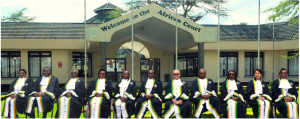By: Christian González
Journal of Global Rights and Organizations, Associate Articles Editor
ARUSHA, Tanzania – On February 26, 2021, the African Court on Human and Peoples’ Rights (Court) made three decisions regarding claims of violations to the right to a fair trial, all coming out of Tanzania. The Court found such a violation in two of the cases but did not find a violation in the third.

The African Charter on Human and Peoples’ Rights (Charter) is what gives the Court jurisdiction over matters appealed on from member states of the Organization of African Unity. It also establishes norms regarding civil and political rights of individuals within member states. In particular, Article 7 of the Charter grants individuals the right to a fair trial. This includes the “right to appeal… against acts violating his fundamental rights,” the “right to be presumed innocent until proved guilty,” the “right to be defended by counsel of his choice,” and the “right to be tried within a reasonable amount of time by an impartial court or tribunal.”
The first case, Zanzibar v. Tanzania, involved the appeal of a man convicted of rape and sentenced to 30 years in prison. The petitioner, a Mr. Mussa Zanzibar, argued that the District Court in Chota made three errors that violated his right to a fair trial: 1) that the District Court convicted him based on the testimony of a single witness whom the court did not satisfy was telling the truth, 2) that the District Court failed to resolve contradictions and inconsistencies in the prosecution’s evidence, and 3) that the District Court failed to warn itself that there needs to be evidence to satisfy the standard of beyond a reasonable doubt for a conviction.
Even though the petitioner did not specifically cite a violation of Article 7 of the Charter, the Court found that he did substantially implicate the same right Article 7 concerns itself with. The Court dismissed Mr. Zanzibar’s claims regarding the District Court’s partial assessment of the evidence because it did not find a basis for interfering with a municipal court’s findings. The Court did, however, find that there was still a violation of Article 7 due to the fact that the District Court did not offer free legal assistance to Mr. Zanzibar. While the Charter does not specify a right to free counsel, the Court looked to its past interpretations of the Charter in which it held that “the right to defense includes the right to be provided with free legal assistance,” even if the petitioner did not request such legal assistance, as was the situation in the present case.
The second case, Zuberi v. Tanzania, involved the appeal of a man convicted of the rape of a ten-year-old girl and sentenced to 30 years in prison. The petitioner, a Mr. Mhina Zuberi, argued that the District Court of Muheza made three errors that violated his Article 7 rights: 1) that the District Court did not provide legal counsel to him, 2) that the District Court did not allow him to call for his own witnesses, and 3) that there were errors in the assessment of law and fact in the evidence.
The Court, like in the Zanzibar case, dismissed the claim of partial assessment of evidence. The Court also dismissed the claim of Mr. Zuberi not being able to call witnesses due to the lack of evidence. However, like in the Zanzibar case, the Court found that the District Court had deprived Mr. Zuberi of his right to be provided with free legal assistance.
The third case, Rutechura v. Tanzania, involved the appeal of a man convicted of a murder committed during the course of a burglary and sentenced to death by hanging. The petitioner, a Mr. Evodius Rutechura, argued that the High Court of Mwanza made three errors that violated his Article 7 rights: 1) that the High Court improperly dismissed his request for extension of time to file an application of review, 2) that the High Court failed to provide free legal assistance to him, and 3) that the High Court improperly assessed evidence against him.
The Court found there was no miscarriage of justice in the High Court’s denial of the time extension request, as the High Court followed its own rules in the dismissal. The Court also found that the High Court did provide Mr. Rutechura with free legal counsel. For this, the Court held that the right to have free legal assistance of one’s own choosing was not absolute, and that “the important consideration is whether the accused was given effective legal representation rather than whether he or she was allowed to be represented by a lawyer of their own choosing.” Lastly, the Court found that there was no showing that there was an improper assessment of evidence simply because the three eyewitnesses to the crime were related.
The Court granted reparations to the petitioners in the Zanzibar and Zuberi cases, each being awarded 300,000 Tanzanian Shillings (129.37 USD). The Court, however, dismissed both petitioners’ requests to be released from prison. The Court also dismissed Mr. Rutechura’s case on all claims.
For further information, please see: